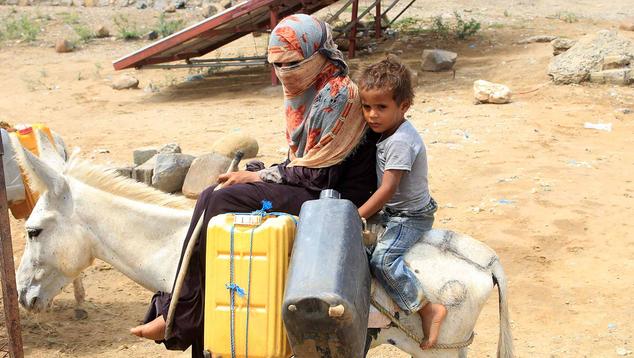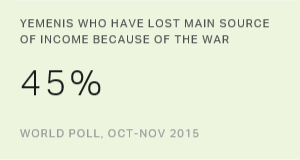Story Highlights
- Record-high 71% of Yemenis unable to afford food
- Four in five older Yemenis suffer from health problems
- Most Yemenis struggling to get by, lack hope for economic situation
WASHINGTON, D.C. -- Almost nine years into a protracted civil war, life in Yemen remains brutally challenging for millions in the country. Gallup’s first measure after two years of being unable to safely survey Yemen reveals that a record-high seven in 10 Yemenis (71%) struggled to afford food in late 2022 and early 2023.
More than a year has passed since a United Nations-brokered peace deal resulted in a cease-fire between Yemen’s warring factions. The six-month truce largely held after it expired in October, and peace talks have advanced with real momentum.
But the security landscape remains fragile, and Yemen is in the grips of a humanitarian crisis. Aside from widespread hunger, millions in Yemen must also deal with a crippled economy and structural issues with healthcare.
Gallup’s most recent survey in Yemen excluded several geographic areas because of ongoing security concerns, small size or remoteness. These areas are home to around 23% of the population.
Quick Summary: The civil war in Yemen started in 2014 when Houthi rebels took over the country’s capital -- Sanaa -- and clashed with government forces. The Houthis emerged in the 1980s among Zaydi Shiite groups in the north of Yemen. They are backed by Iran, which shares long-standing geopolitical tensions with Saudi Arabia.
In 2015, a Saudi-led coalition intervened in Yemen, launching mass air strikes on Sanaa to push back the Houthis and support the Yemeni government led by then-President Abd Rabbu Mansour Hadi. The coalition introduced a continuing blockade, obstructing the flow of food and medicine to the country.
Roughly 400,000 Yemenis have died from the war’s direct impact and the resulting increase in hunger and disease, and millions more have been displaced. As reflected in the high percentage who have trouble affording food, war has decimated Yemen’s food systems, resulting in unprecedented hunger levels. The U.N.’s World Food Programme’s emergency response in Yemen is the largest in the world.
Four in Five Older Yemenis Suffer From Chronic Health Problems: Yemen’s health services have been severely strained during the conflict. Outbreaks of disease -- including cholera, diphtheria and, more recently, COVID-19 -- are frequent. The World Health Organization estimates that approximately half of all health facilities in the country are out of service or only partially functioning.
In the most recent survey, more than one in four Yemenis overall (28%) said health problems prohibited them from doing things other people their age could normally do. The health crisis in Yemen is hitting older people particularly hard; about four in five Yemenis aged 50 and older (79%) claimed to suffer from such chronic health problems, the highest figure among this age group of any country in the world.
Yemenis Struggle to Get By, Few See Situations Getting Better: Nearly a decade of war has brought Yemen’s economy, which has shrunk by nearly half since the start of the conflict, to its knees.
In 2022, about half of Yemenis (48%) said they are finding it very difficult on their present income, behind only Afghanistan (71%), Lebanon (66%) and the Democratic Republic of the Congo (50%) worldwide. The future does not look much brighter: Two-thirds of Yemenis (67%) think their local economy is getting worse, rather than better (12%).
Among the structural issues plaguing Yemen’s economy are the fall in the Yemeni rial, high inflation, and a heavy reliance on imports. Further, Houthi attacks on the country’s oil export infrastructure last year have hampered the government’s ability to provide basic services.
Bottom Line
There is some hope for an end to the conflict in Yemen in the near future. China recently brokered a peace deal between Iran and Saudi Arabia that included the restoration of diplomatic relations, with Iran agreeing to stop covert shipments of weapons to the Houthis.
The initial peace deal in Yemen enabled fuel imports to flow more freely through the Hodeidah port, and the Sanaa airport reopened for commercial flights. Civilian deaths and internal displacement fell, as did the price of essential goods. The Saudi-led coalition and the Houthis have also agreed to prisoner swaps, which many hope could lead to a permanent cease-fire.
However, the list of immediate humanitarian concerns in Yemen is long. Ensuring that people’s basic needs -- food, health and safety -- are met continues to be an enormous challenge for the international aid community. Progress toward peace is far from guaranteed.
To stay up to date with the latest Gallup News insights and updates, follow us on Twitter.
For complete methodology and specific survey dates, please review Gallup's Country Data Set details.
Learn more about how the Gallup World Poll works.



